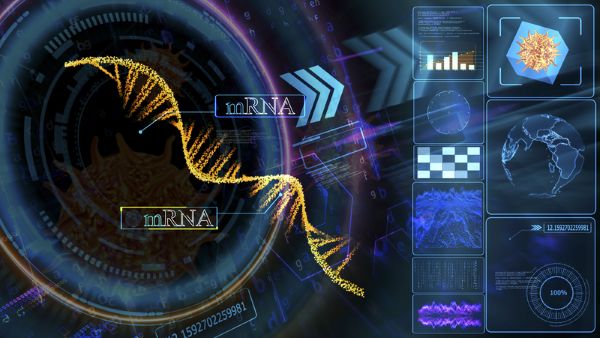Researchers at Germany’s University of Cologne and University Hospital Cologne have provided evidence that using mRNA-based COVID-19 vaccines not only produces an adaptive immune response but also long-term changes to immune cells. The findings appear in the journal, Molecular Systems Biology. The mRNA vaccines’ success in providing immunity for COVID-19 has led to new avenues of research using the method to develop Dengue, Ebola, Lyme, MS, Lupus and Zika vaccines. A universal vaccine using mRNA to treat seasonal influenza could eliminate the need to reformulate yearly, a process that often bets on the wrong predominant flu strains, leading to less effective preventive vaccination programs. A future mRNA vaccine may be used to target cancer cells and build the body’s immune resistance mechanism to be able to eliminate the scourge.
mRNA and Anti-Vaxxers
One would think that the current zeal being practiced by the U.S. Trump administration to cut funding from government departments would spare the health of Americans. Apparently, this is not the case under Elon Musk’s DOGE and the tutelage of anti-vaxxer, Robert F. Kennedy Jr.
Kennedy was appointed to run the primary agency responsible for biomedical and public health research, the National Institutes of Health (NIH), a part of the Department of Health and Human Services. Today, Kennedy fired 10,000 of the Department’s employees. In those firings, vaccine-related research has become endangered. Kennedy has a particular bias against vaccines and mRNA research.
Why target a scientific and technological breakthrough that saved tens of millions of lives during the COVID-19 global pandemic?
What are the trust issues that people like Kennedy and other anti-vaxxers have?
Anti-vaxxers oppose vaccinations in general but, like Kennedy, seem particularly vehement about mRNA. Their reasons include ideology, religion, disinformation, conspiracy theories, pseudoscience, and a lack of basic understanding about DNA and cellular biology.
Social media influencers and social media sites like Facebook, YouTube, and X spread the anti-vaxxer narrative with people like Kennedy claiming mRNA was unsafe and untested technology, despite decades of validated scientific research that pointed to the contrary.
Here are the anti-vaxxer arguments that he and others promote against the science and technology of mRNA vaccines:
- mRNA alters our DNA. This claim demonstrates a lack of basic understanding of cellular biology. mRNA stands for “messenger RNA.” It’s a courier that takes instructions from genes containing DNA and delivers the message to the production centres responsible for creating proteins in cells. With the COVID-19 vaccine comes instructions to create the characteristic virus spike protein and, as a result, generate antibodies that recognize it and defend cells by blocking the virus from entry.
-
mRNA vaccines are government overreach, part of a plot to surveil and control people. Some anti-vaxxers believe COVID-19 vaccines contain embedded microchip trackers. Many anti-vaxxers also see mRNA vaccines as the products of big pharma and, therefore, untrustworthy since these companies are only in it for the money.
-
mRNA vaccines cause infertility. This theory was popularized by Wolfgang Wodarg, a German physician who is known for spreading COVID-19 misinformation. This theory claimed the spike protein was similar to a protein produced for placenta development during pregnancy. The claim is baseless because the two proteins share no meaningful similarities.
- mRNA vaccines are too new. Older vaccines use “proven” delivery mechanisms. They argue that the mRNA vaccines have been developed too quickly without sufficient testing. mRNA research has been around for several decades. The COVID-19 pandemic was the trigger to move it from lab and animal studies to human clinical trials, producing the vaccine expeditiously and in sufficient volume to save millions of lives.
- mRNA vaccines cause adverse side effects. Every vaccine triggers reactions. Positive reactions are what vaccines are all about. Some reactions, however, aren’t positive, like minor soreness at the vaccination site, headaches, muscle pain, joint pain, and low-grade fevers or chills. These are largely considered inconsequential. Rarer reactions to mRNA COVID-19 vaccines have included cases of mild myocarditis and pericarditis. More serious are cases of thrombosis (blood clots) and anaphylaxis (an acute allergic reaction). We are talking about 5 in a million administered doses. That’s why not using the mRNA vaccines because of rare adverse side effects is akin to throwing the baby out with the bath water.
- Natural immunity is better than any vaccine, including mRNA. All vaccines are unnatural and potentially harmful. Natural immunity, known as herd immunity, is better. Unfortunately, in the case of COVID-19 and many other highly infectious diseases, waiting for herd immunity has produced millions of infections and many deaths. In a review published by the NIH, it concluded in a sampling of 21 million people that unvaccinated individuals were 2.46 times more likely to die from COVID-19 compared to those who were vaccinated. So much for natural immunity.
mRNA And The Epigenetic Training of Our Immune System
The research demonstrating mRNA vaccines having long-term positive effects represents a new twist on the development of this technology. It is based on an understanding of what are immune system is and the two components which make it up. These are the adaptive and innate immune systems. The adaptive develops responses to new threats. The innate provides broad protection against infections.
The innate system is modified by epigenetic means. Epigenetics refers to changes to our genome and gene activity not involving alterations to our DNA. mRNA plays a part in epigenetic changes by training our immune system to produce a sustained response to an invasive pathogen. When vaccinated for COVID-19, observed epigenetic changes produced long-term memory for the immune system. Multiple boosters assisted in making these epigenetic changes last longer, creating a prolonged immune response.
The innate system changes through modified epigenetics helped fight off COVID-19, but it also had a broader and nonspecific impact on other viruses and bacteria for prolonged periods, seen as “crucial to persistent immunity” according to Robert Hänsel-Hertsch, who is an expert in the field of epigenetics. The findings have implications for future vaccination strategies not just for coronaviruses like COVID-19, but for many other pathogens.









